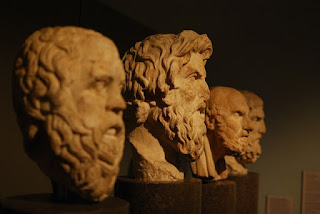Virtues as splendid vices Continued
We are still on the Fallen image of God next page 148; Reformed Ethics; Herman Bavinck.
I feel it is important to look at his opening statements because Bavinck is the type of theologian not to leave any stone unturned.
He says
“Furthermore, Reformed theologians believed that the moral virtues of the pagans came from the general operation of the Holy Spirit and did not arise from any innate ability of the human will. That is why some preferred to use the term "virtue” for pagan morality and reserve the term "good works” for Christian morality. The former is considered under philosophical ethics, and the latter under specifically Christian ethics. These two differ in their foundations, their norms, and their goals. Human dominion over nature has been weakened and robbed of its spiritual character, but not eliminated; it has been impeded, but not destroyed. Science and scholarship hear witness to the human yearning for knowledge of earthly things. Philosophy and the natural sciences are gifts from God that must know the rejected or despised. Art in the broader sense of subjecting the earth and making it an instrument for the blessing of humanity is a power, like science, that can be used for or against God. Scripture, however, does point to progress in culture.”
Hmm I seriously have problems with this; That virtues of the Pagans are the general operation of the Holy Spirit and not from any innate ability of the human will. I can understand why this was done; I think this was done to protect the sovereignty of God. I cannot accept this premise because it makes human beings into dummies who cannot work things out. Obviously without the work of the Holy Spirit everything would collapse.
So virtue for Pagans and Good works for Christians.
What does virtue mean then?
“Virtue is the quality of being morally good. If you're writing a screenplay and you want it to be a real tearjerker, make sure your hero is full of virtue.
The word virtue comes from the Latin root vir, for man. At first virtue meant manliness or valor, but over time it settled into the sense of moral excellence. Virtue can also mean excellence in general. One of your virtues might be your generous willingness to help out your friends. The phrase by virtue of means "as a result of" or "by authority of." You will achieve success by virtue of hard work (or by virtue of inside connections).”
Taken from https://www.vocabulary.com/dictionary/virtue
From this definition virtue is about what noble thing one achieves from one’s own resources. Virtue understood in this way is not compatible with grace and faith. I agree with that.
The problem I have is that knowledge is a part of the universe trying to work out a logical problem is not a virtue or a good work In the same way that nuclear can make people better in a hospital or blow the earth to smithereens.
Yes, I certainly agree with Bavinck in the last of this introduction that knowledge is a gift of God.
What do you think?
Should Christians use Pagan resources to defend Christian truths?
Next week we will continue to look at what Bavinck thinks. Whether we agree with him or not, we will learn a lot more than we know now and I hope and pray that our faith in Christ becomes stronger.



Comments
Post a Comment
Yes